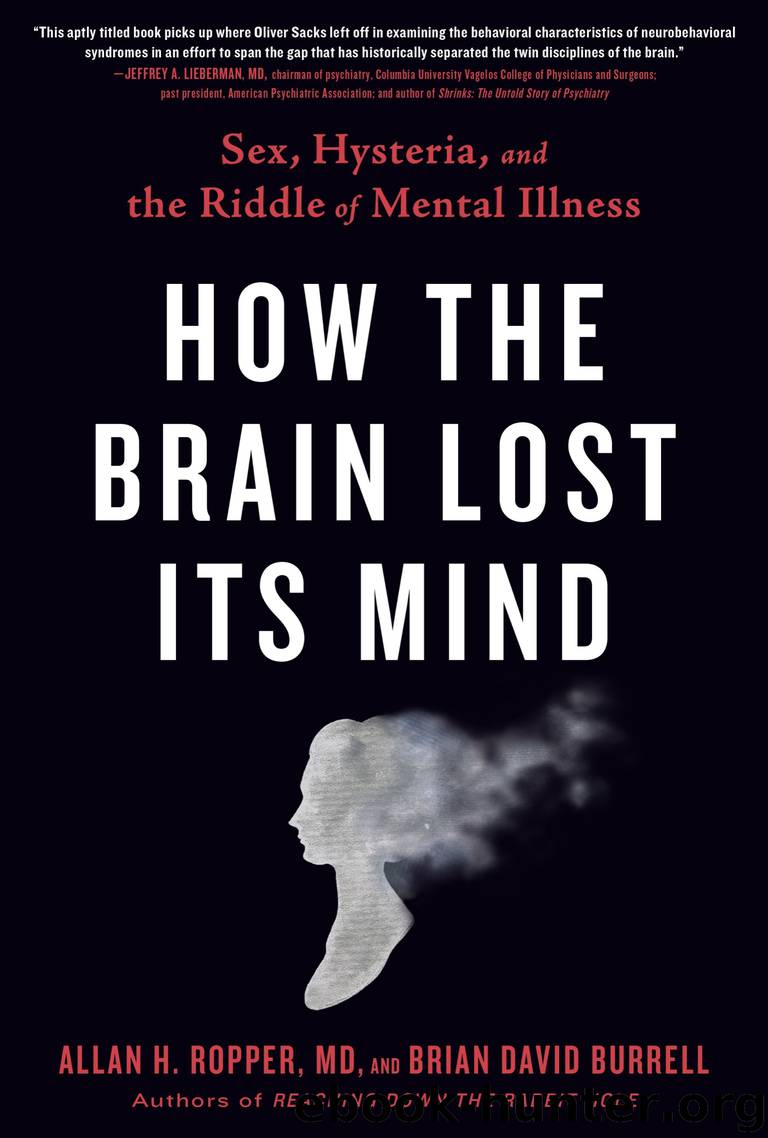How the Brain Lost Its Mind by Allan H. Ropper & Brian Burrell

Author:Allan H. Ropper & Brian Burrell
Language: eng
Format: epub
Publisher: Penguin Publishing Group
Published: 2019-08-19T16:00:00+00:00
* * *
—
In the two decades following Charcot’s death, neurology as a therapeutic discipline had been moribund. Its great breakthroughs had occurred in the realm of mapping the cerebral cortex and identifying the cellular structure of gray matter. Hysteria and hypnosis had proven to be dead ends. Psychiatry, meanwhile, had produced the very useful Kraepelinian dichotomy of dementia praecox and manic-depressive illness, a classification scheme still in place today in the guise of schizophrenia and bipolar illness. As for therapeutic measures, psychiatry continued to focus on the body and its problems rather than on the mind and its demons. Rest cures, water cures, dietary measures, and tranquilizing drugs dominated the bill of fare at the spas. Into this landscape of psychoses, neuroses, and the psychopathology of everyday life, Freudian analysts provided some refreshingly novel explanations and answers. It is not surprising that someone of Mabel’s disposition chose Jelliffe over Sachs.
Sachs may have represented the old school and Jelliffe the new, but one awkward fact flew beneath the radar. Sachs had an encyclopedic knowledge of general medicine, while Jelliffe and most of his cohort did not. Jelliffe had trained in neurology and psychiatry, but had concentrated his intellectual efforts on writing, editing, and publishing, with an emphasis on psychoanalysis. He may have had a prodigious intellect, but not as a clinical diagnostician or medical researcher. He represented everything Sachs railed against: self-promoting celebrity physicians, the sexualization of every aspect of human relations, and the elimination of the brain from considerations of the mind.
Like Freud’s famous first patient Dora, Mabel Dodge suffered from anxiety rooted in the threat posed by syphilis. Her own father, like Dora’s, was treated for it. In her memoirs, she also acknowledges having married three men even though she knew they had the disease, and having aborted a pregnancy conceived with Edwin out of fear of congenital syphilis. She struggled to understand her purpose in life while pursuing relationships in which she subordinated herself sexually and intellectually to men. She quit therapy with Jelliffe after he insisted she see no other therapists, and then began seeing Jelliffe’s teacher, A. A. Brill, who encouraged her to write. She began with a Hearst newspaper column, and continued the journal she had begun with her sessions with Jelliffe, all while in the throes of anxiety and depression. To make matters worse, she also had to seek treatment for her syphilis infection. Like Freud’s early patients, she exhibited symptoms of two conditions, hysteria and syphilis, but by this time, syphilis had legitimized psychiatry. It had brought sex and all forms of mental illness into the same sphere.
In 1917, Mabel and Maurice Sterne moved to Taos, New Mexico, and established an arts colony in the desert. Their marriage hung by a thread. Now a writer of some fame, Mabel attracted artists and writers, including Ansel Adams, Georgia O’Keeffe, Marsden Hartley, D. H. Lawrence, and Aldous Huxley, for extended visits. Maurice eventually left, and Mabel married her fourth husband, the Native American Antonio Luhan, who, like Edwin and Maurice, infected her yet again with syphilis.
Download
This site does not store any files on its server. We only index and link to content provided by other sites. Please contact the content providers to delete copyright contents if any and email us, we'll remove relevant links or contents immediately.
Periodization Training for Sports by Tudor Bompa(8217)
Why We Sleep: Unlocking the Power of Sleep and Dreams by Matthew Walker(6661)
Paper Towns by Green John(5142)
The Immortal Life of Henrietta Lacks by Rebecca Skloot(4552)
The Sports Rules Book by Human Kinetics(4348)
Dynamic Alignment Through Imagery by Eric Franklin(4181)
ACSM's Complete Guide to Fitness & Health by ACSM(4023)
Kaplan MCAT Organic Chemistry Review: Created for MCAT 2015 (Kaplan Test Prep) by Kaplan(3972)
Introduction to Kinesiology by Shirl J. Hoffman(3745)
Livewired by David Eagleman(3733)
The Death of the Heart by Elizabeth Bowen(3583)
The River of Consciousness by Oliver Sacks(3575)
Alchemy and Alchemists by C. J. S. Thompson(3484)
Bad Pharma by Ben Goldacre(3399)
Descartes' Error by Antonio Damasio(3250)
The Emperor of All Maladies: A Biography of Cancer by Siddhartha Mukherjee(3115)
The Gene: An Intimate History by Siddhartha Mukherjee(3076)
The Fate of Rome: Climate, Disease, and the End of an Empire (The Princeton History of the Ancient World) by Kyle Harper(3036)
Kaplan MCAT Behavioral Sciences Review: Created for MCAT 2015 (Kaplan Test Prep) by Kaplan(2961)
